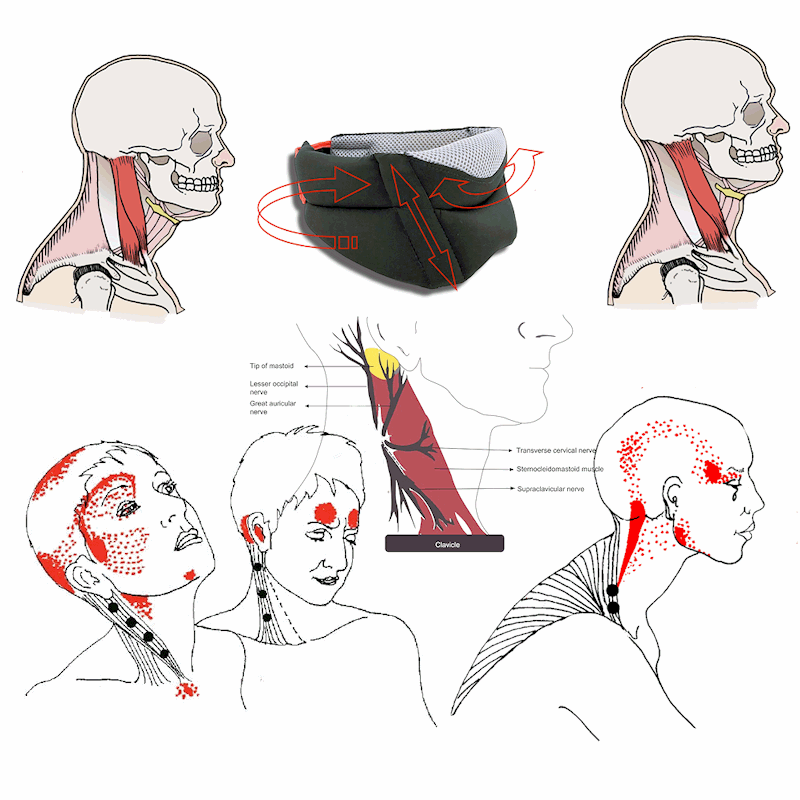Long Term Collar For Spondylosis
Many individuals suffer from a degenerative condition of the neck called cervical spondylosis. There are stages of this condition, which can result in symptoms ranging from simple neck pain to a pinched nerve or cervical radiculopathy. Many will benefit from a long term collar for spondylosis.
Because the condition and symptoms tend to be long lasting, may are seeking solutions for a long term collar for spondylosis. Neck collars can provide benefits for neck pain and for those suffering from spondylosis, however, wearing a collar, especially a rigid one, can pose problems like muscle weakness and dependency.
Those with mild symptoms may benefit from a softer long term collar for spondylosis, while those with more painful symptoms may need more support in a collar or even one designed for head support. Fortunately, there are collars that provide comfort as well as support for long term use.
Cheaper foam type collars provide very little support, but can help with posture and provide warmth when needed and vary in support level. While they may be comfortable, very cheap ones for long term use will tend to wear down quickly and will not provide a level of support required when there is inflammation from structures involved with spondylosis. The inflammation can result from irritation of the joints, ligaments and nerves, which undergo changes that can make the cervical spine less stable and prone to further deterioration.
Solutions
In order for a support to be used as a long term collar for spondylosis, a better quality one will provide comfort and support that will last a long time without needing frequent replacement. A collar for long term use should provide an acceptable amount of support and there is always a compromise between support and comfort. The ChiroCollar is a soft, comfort collar uses temperature control technology to provide soft support and help keep the neck from temperature extremes, with a unique support design. This can be beneficial to a sensitive neck that gets cold and goes into muscle spasm. It is also beneficial for those in warmer climates, where wearing a neck collar can be too hot.
In general, a soft neck collar using quality materials will be a good for long term. Comfortable, breathable and easy to clean, the soft collar provides support for mild to moderate symptoms and comes in an attractive design. This same collar is also available as a cervical neck collar for symptoms that are moderate and require a higher level of support. It has a plastic orthopedic insert, which offers a higher level of support, while maintaining all the advantages of the soft collar.
Sizing A Long Term Collar For Spondylosis
The above collars are available in different heights for different sized individuals. The general method to size the height is to measure from the bottom of the jaw to the level of the collar bones. Most correspond to small, medium and larger height. However, spondylosis can present with altered function of the neck and it is important to consider the posture that you will need in choosing the right size collar. This can be done by measuring at the level where you feel the most relief.
You may need a higher support if you head feels more stable in a slightly upward position. Similarly, some degenerative conditions affect the back joints of the neck and extending the head up may be more painful. In this circumstance, certain individuals feel relief from symptoms and more stable when the head is bent slightly forward. Therefore, these factors should be taken into consideration when choosing a collar for spondylosis.
For those with more advanced symptoms, a more rigid collar may be required. This could be for those who can not tolerate much movement of the head, for those who will undergo surgery or those who have undergone surgery. Some conditions of spondylosis are just too unstable or painful and will necessitate some type of surgical procedure to help. For these individuals, a lightweight Philadelphia collar made of special material is a good spondylosis brace. A popular collar for this is the universal collar that is adjustable for height and can be changed as the condition changes.
Conclusions
There are various solutions for long term use of collars. Even some inflatable traction collars may be useful. It may be necessary to combine different types as a strategy to best manage symptoms. Take into consideration you symptoms and level of support needed in general and particular needs for activities of daily living. This, along with choosing a collar of high quality materials and design will make choosing a long term collar for spondylosis easier and more beneficial.
According to a study in the British Journal of Rheumatology, soft cervical collars are the least restrictive, allowing the closest to normal range of motion and have good compliance. As many as 76% of patients report reduced pain with their use.
While some indicate there is a problem with muscle wasting with long term use, it is doubtful whether any muscular changes can be attributed to simply wearing a collar or if it is the physiologic mechanisms of pain avoidance.
In patients with whiplash, studies often indicate that early mobilization and activity is superior to immobilization and soft cervical collar use. However, this does not preclude the use of both.
The authors of an article in Current Reviews in Musculoskeletal Medicine state, “However, more recent studies have not found any long term benefits of early aggressive treatment as compared to immobilization.”


